Posts Tagged ‘Women’s Empowerment’
Photo Essay: The Afghan Seamstress Sewing Beautiful Garments in Her New Community
Meet Samira
On a cold day in the middle of Illinois winter, the home of Samira* and her family has vibrant colors. Though the family only arrived in the U.S. a few months before, they have been busy. And much of what Samira has done is create. This photo essay showcases the beautiful garments that Samira makes.
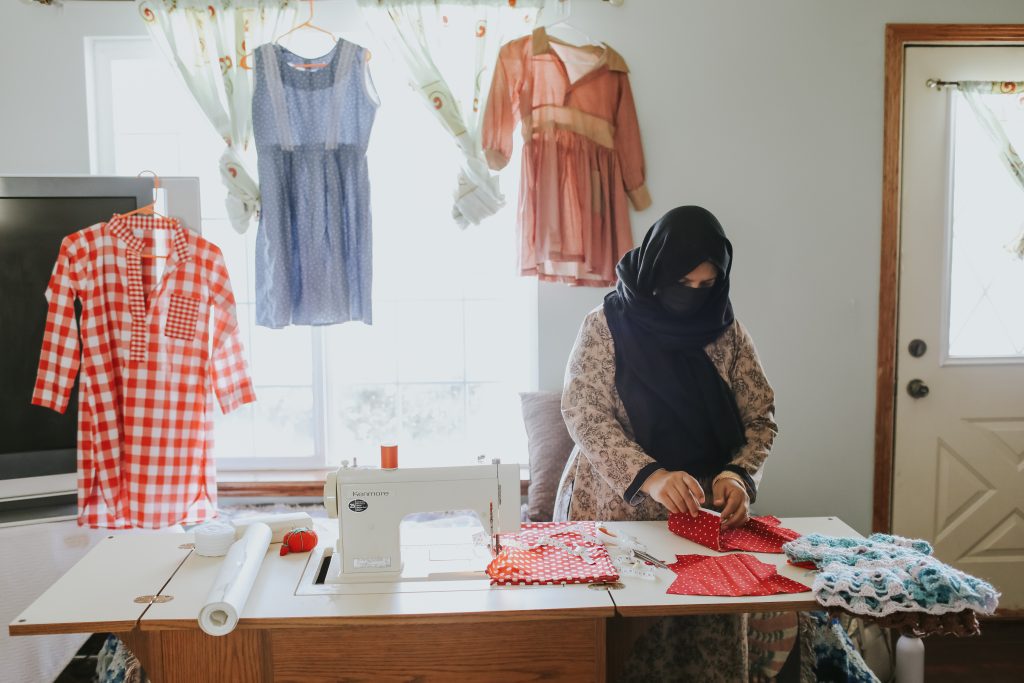
In Afghanistan
In her home community in Afghanistan, Samira* was a gifted seamstress. With her skills in sewing and crocheting, she crafted gorgeous wedding gowns, dresses, and other apparel.
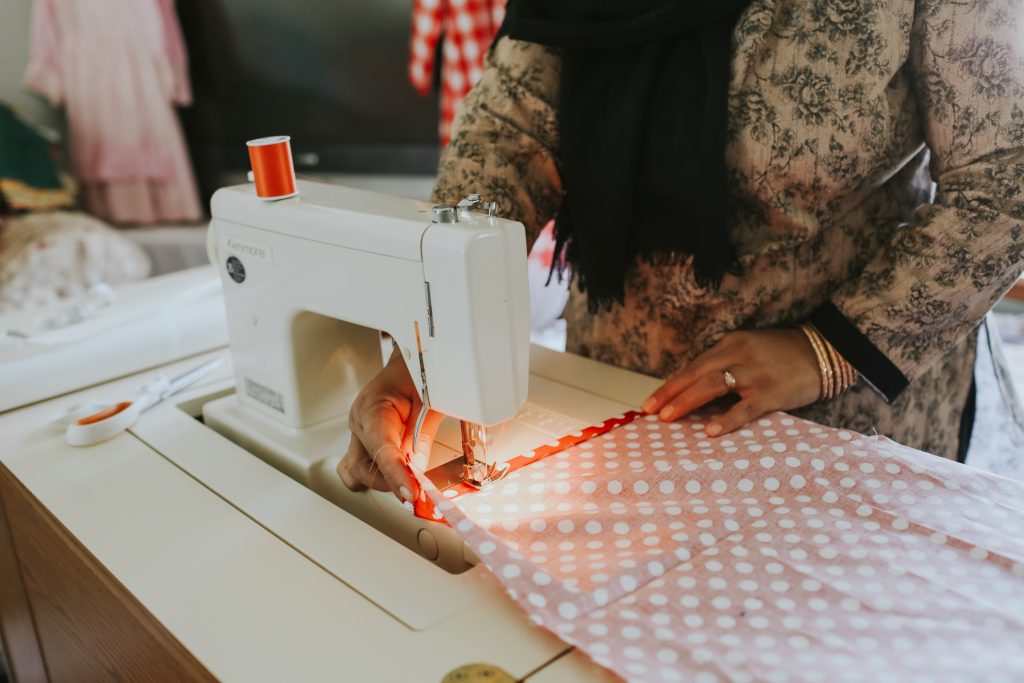
The days of making wedding dresses for friends and relatives in her hometown in Afghanistan are long gone. Today, they are documented only through a few photo prints.
On the Journey
Samira carried those photos with her when the family Afghanistan. They came with her to the U.S. military base where her family awaited resettlement. And now, in their new home in the suburbs of Chicago, Samira looks at her photos as mementos of a life left behind.
But even on their family’s journey, Samira found ways to use her talent and scarce resources to meet her family’s needs. She transformed a bedsheet into a dress for her daughter. She made yarn by hand from spare materials.
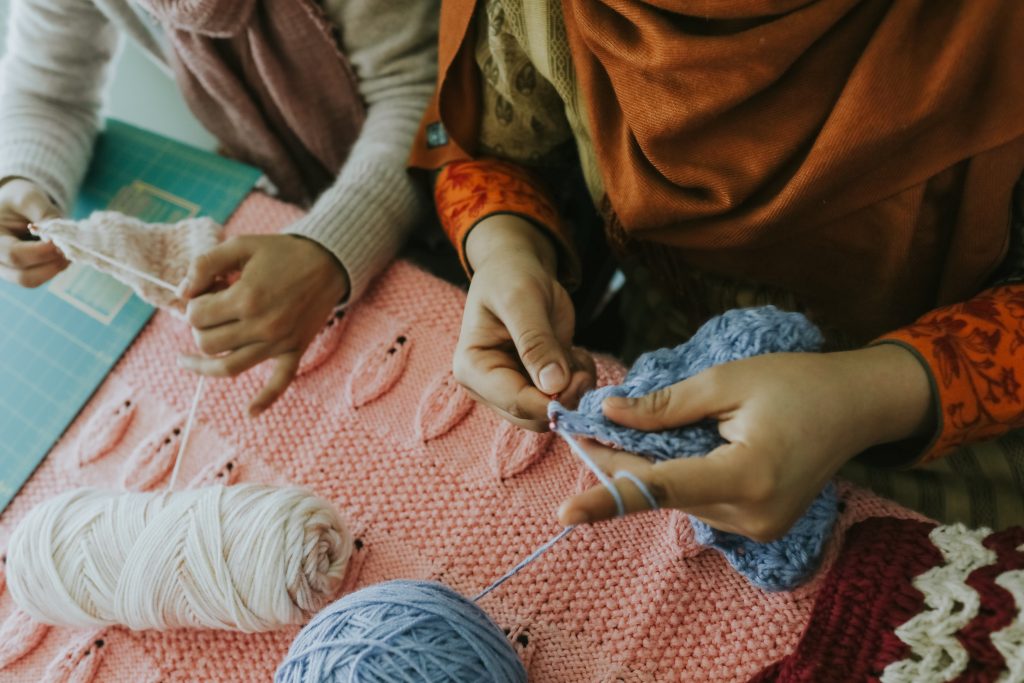
In a New Community
When World Relief Chicagoland welcomed Samira and her family to Illinois, staff learned of Samira’s skill as a seamstress. Thanks to the generosity of our supporters, she gained a sewing machine, fabric, thread, and other sewing tools. Now, she uses her skills to create a home and support her family in the United States.
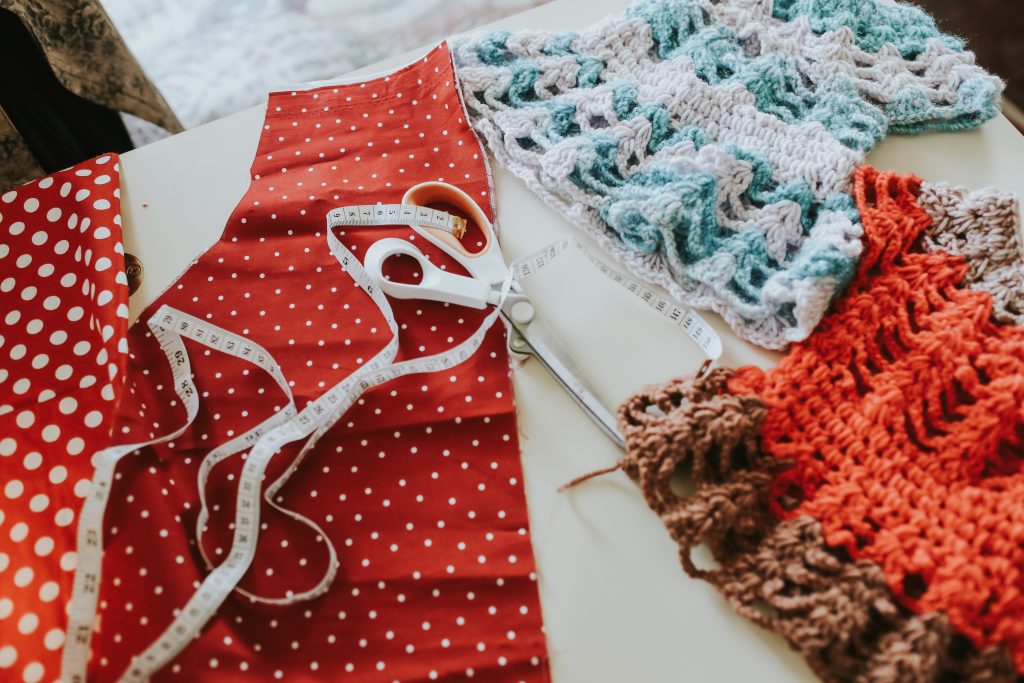
The next time World Relief Chicagoland staff saw her, Samira and her daughters were wearing brand-new dresses sewn just that week!
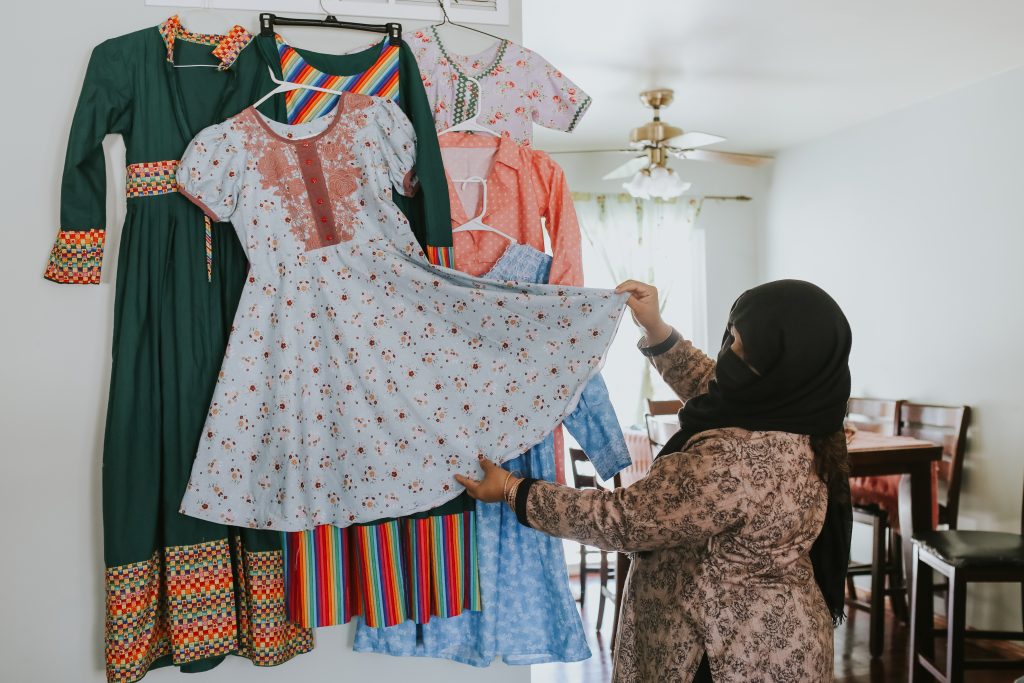
In her home, during cold Chicago winter, Samira crochets scarves, gloves, and hats. She and her daughters sew dresses. And while Samira left so much behind, now she creates beauty in her new community.
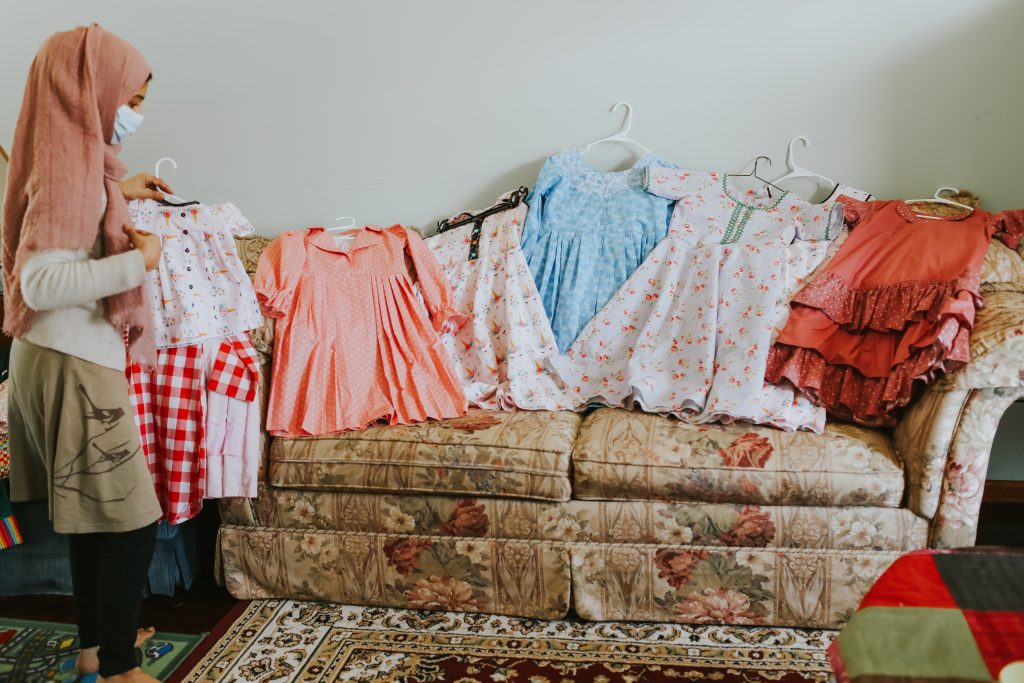
Images in this photo essay by Roxanne Engstrom of Hawa Images.
Read More
World Relief Chicagoland’s 2021 Year in Review is an annual report that features Samira’s story along with other stories of hope.
Click here to read the Year in Review.
As you read, we hope that reflecting on the year behind us inspires you. And that it reminds you of the power of creating welcoming community together.
Women and Men Leading Together
“So God created humankind in his own image,
in the image of God he created them;
male and female he created them.”
– Genesis 1:27
In the Beginning
In the beginning, God created — God separated the land from the sea; made plants and animals, fish and birds, men and women. When it was finished, God looked around at all that had been made and called it very good.
As a woman, I (Nancy), have sometimes struggled to understand what very good means for me. Like so many women across the world, I grew up in a society that viewed men as superior to women.
I was taught to believe that God was a man and that women were the cause of all the troubles and hardships that humans currently face because women sinned first.
In my work as a Monitoring & Evaluation Manager and Integral Mission Coordinator at World Relief Kenya, I often engage with pastoral communities who hold very strong beliefs about women and their positions in society. There have been times when I have felt like I am not good enough due to the way people have reacted to me and the directions I give them.
And yet, despite all this, God is at work.
God’s Vision for Gender Equality
I never dreamed that working at World Relief would transform the way I view myself and other women. But that’s what happened when, in 2021, my colleague James and I walked through a curriculum called Women and Men Leading Together. World Relief is currently rolling out this curriculum to a majority of its international programs staff.
This curriculum lays out a biblical foundation for gender equality by looking at five key points:
- Imago Dei – we are made in the image of God
- Patriarchal Cultures – how they harm both women and men
- Jesus’ Radical Example of Redemption and God’s Original Design for Marriage
- The importance of using rules of interpretation when reading scripture
- Organizational Leadership and countering gender inequality in the workplace
Over the course of eight weeks and seven learning sessions, we learned that men and women are created equally in the image of God, a concept often referred to as Imago Dei. And while men and women are two different expressions of God’s image, the authority to “practice dominion over all the earth” has been delegated to us equally.
We also gained a deeper understanding of the patriarchal cultures we live in, and how cultural norms can often trap both men and women into harmful gender stereotypes.
Culture often tells men that they must be the protector and provider and that they should be the opposite of women, never showing any emotion or gentleness. On the contrary, women are told they are weak, less than men and should yield all leadership and authority to men.
Both of these viewpoints, however, fall short of God’s desire for the freedom and flourishing that God intends for each one of us, regardless of our gender.
God’s Word is Powerful In Us
As we worked through the curriculum, I (James) gained an expanded understanding that everyone — women and men — are gifted and can serve in any capacity. A person should not be judged because of their gender, and everyone deserves equal respect. Jesus, himself, had women in his inner circles. He taught them and invited them into leadership alongside him.
The training helped me to be even more deliberate in being mindful of others, especially across the gender divide. We are all gifted and endowed, and we need to support one another.
The biblical references were very enlightening and helped me see that some of the arguments against gender equality that I had grappled with previously were based on a misinterpretation of scriptures. I now feel more equipped to advocate for gender fairness in the community, and I have the knowledge and basis needed to back up my viewpoint.
For me (Nancy), learning about the examples of powerful women in the Bible like Deborah, Esther, Ruth, Naomi and Priscilla was very encouraging in my faith. I am stronger and more confident and have begun stepping up to lead more in my local church and at my place of work.
The Holy Spirit revealed to me that I am a child of God, fearfully and wonderfully made in his image. I should not fear anything for God is always with me and will never forsake me. As Psalm 121 says, my help comes from God.
Carrying the Vision Forward
The transformation we have experienced and the understanding we’ve received has now given us the opportunity to teach and train others on our team, in preparation for incorporating more gender-equality work in our programming.
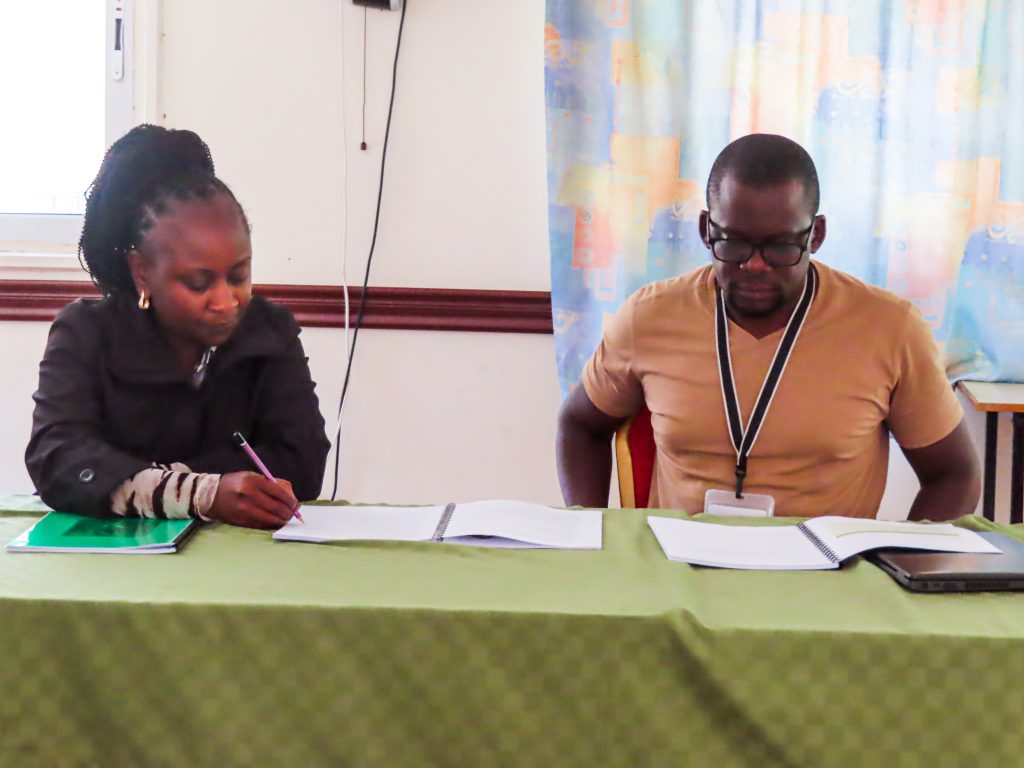
We have noticed that many women in our workplace, especially in our field offices, seem to lack the confidence God longs for them to have. They often stay silent or hesitate to address others in public settings. It is up to us as leaders to walk with these ladies, intentionally giving them roles in workshops as a way of building up their confidence as they grow.
Research from the World Economic Forum, Pew, Harvard Business Reviews and others have shown that organizations are more successful where women are equally represented in leadership.
Not only that, but elevating women in leadership and leading alongside one another as equals is a call to be counter-cultural. We get to follow Jesus’ example and counter the effects of gender bias in the workplace.
Men also have a very vital role to play in combatting gender inequality in the workplace. In most cases, gender authority and imbalance is in favor of men. Men, therefore, have to use their positions of authority to be the agents of change that are needed to create a gender-equal world. And men can begin this transformation by changing how they treat their wives, daughters and mothers right within their own homes.
As we, and others across World Relief’s global offices, continue to engage with this training, it is our hope that our fellow staff members, church partners and volunteers can approach this curriculum with an open mind, be willing to learn from what was God’s original intention at creation and adjust our actions accordingly.
In Kenya, we have already seen our entire staff team be more keen on reducing gender bias in our day-to-day work and conversations. Moving forward, we are committed to assessing our progress not just through our interactions with one another, but through our staffing and leadership structure, mainstreaming gender activities across all our programming, and working to ensure our policies and procedures align with our gender-inclusive vision.
We are grateful for the work that God is doing in us and among our team to bring healing and restoration to our world. God’s word is, indeed, more powerful through us because of the work the Spirit has done within us.
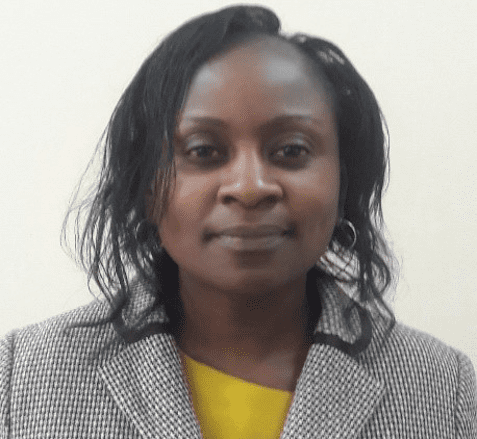
Nancy Nasirumbi Owola joined World Relief in 2017. She is a social entrepreneur with a passion for serving the most vulnerable through teaching business skills to those disadvantaged or underprivileged in the community. Nancy has worked in community development since 2006 and has also worked as a consultant, offering technical support to 20 Kenya Community Development Foundation partners in Value Chain Development & Enterprise Development. Her professional background includes entrepreneurship, monitoring & evaluation, business administration & management, and marketing. Today, she serves as the Integral Mission Coordinator as well as the M&E Evaluation Manager for World Relief Kenya.
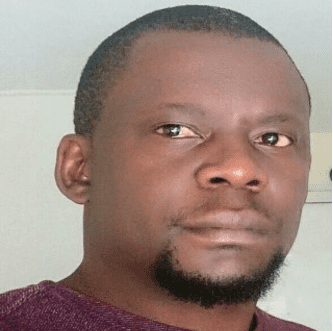
James Wanda joined World Relief Kenya in May 2020 as the SCOPE and National Health Manager. He graduated with a Bachelor of Science in Nursing from Moi University and has a Diploma in Project Management from Kenya Institute of Management. He is currently pursuing a Master’s Degree in Public Health at Jomo Kenyatta University of Agriculture and Technology. With more than 15 years of experience in public health programming, he’s worked with organizations such as The Walter Reed Project, Catholic Medical Mission Board, Jhpiego Kenya and AMREF. Prior to joining World Relief, he worked as a Project Manager and acting Executive Officer for Kenya Pediatric Association. James believes in justice and fairness to all and service to humanity is his call.
Women’s Empowerment Programming is Everywhere
When people ask us, “Where is World Relief’s women’s empowerment programming?” Our answer is: It’s everywhere.
Transforming how men and women live, relate and honor God in their relationships is at the very heart of what we do. We recognize that women and girls don’t exist in isolation. They live, they work and they go to school in community. And only with community transformation will gender reconciliation, empowerment and transformation truly occur.
While we have several programs that center around women — trauma-care groups for sexual and gender-based violence victims in DR Congo, maternal health programs for mothers and teen clubs for pre-adolescent girls — we incorporate the idea of gender equality into nearly all of our international development programming, starting at the belief level.
Today, I want to share two stories with you about a woman named Salina — one fictionalized, and one the truth. Salina’s story illustrates the power of World Relief’s gender-integrated approach and is proof that together, we can #breakthebias and create communities where women and girls can thrive.
Salina’s Story: What Often Happens
Salina is a young wife and mother living in Malawi. She decides to join a savings group and has great hope that this program will change her life. At first, she is encouraged by the community of women and the potential opportunity. But it’s not long before her husband, Chilaw, becomes resentful of the profitable women’s program.
When Salina takes home her savings, Chilaw takes her hard-earned money for himself and spends it frivolously. As a result, Salina is unable to invest in what she’d hoped — nutritious food for her children, health insurance and school fees. Her girl child, Charity, in particular, remains malnourished and uneducated.
Though Chilaw brings home produce from a local agricultural group, both parents prioritize food for their son over Charity. They sell the remaining produce at the market and send their son to school with their earnings, but Charity remains at home doing household chores. She has little awareness of her worth as a young woman and awaited the day when she’ll be married for a bride price and step into the same life her mother has had. Salina’s home is trapped in a vicious cycle of economic, social and relational poverty.
Now, let’s rewrite this story, and see what happens when World Relief’s gender-integrated approach is applied.
Salina’s True Story
In Salina’s real story, she hears about a savings group. She wants to join, but she’s afraid of what her husband might think. After all, he is the decision maker of the family. Nevertheless, World Relief hears of Salina’s interest and encourages her to join.
Simultaneously, a local church volunteer meets with Salina and her husband, Chilaw. They explore a transformative curriculum that teaches Chilaw about his wife’s inherent value and worth. He learns that she is also created in the image of God, deserving of love and respect and possessing a God-given potential that must be nurtured, honored and developed.
He encourages her to go to the local savings groups and when she saves money, they sit and talk together about how to use it along with the money Chilaw earns from selling his agricultural produce.
Salina and Chilaw also learn about the value of their daughter, Charity, and decide it’s time to send her to school with the money they’ve saved. Now that Charity is in school, World Relief encourages her to attend the local adolescent girls club. Chilaw thinks it’s important for his daughter’s wellbeing and development, so he also encourages her to go. Charity learns about the power of her education and the perils of early marriage and sets goals to go to university.
Can you spot the difference?
In both stories, savings, agriculture, nutrition and adolescent clubs are in place, yet only in the second of these stories do these programs have a restorative, transformational and generational impact on the lives of Salina and her family.
The real transformation comes mostly prior to the programmatic benefits — within the home, at the belief and value level. This is the power of our restorative gender work.
We know savings, agricultural and countless other technical programs work most effectively when they build upon the foundational work that has been done within the home, between husband and wife, parents and children.
That’s why, at World Relief we approach female empowerment at the belief level, starting with the family structure. We see the empowerment of women and girls happen not because our programming is exclusively focused on women and girls, but because we work to ensure the whole community recognizes and respects the voices, roles and unique gifts of these women and girls.
Our transformative curriculums — focused on God’s truth that each man, woman and child are made in the image of God — drive this innovative approach to relief and development. We believe that unless relationships have been transformed so that both man and woman, boy and girl, are equally valued, given equal opportunity and are equally empowered, the impact of our programming is compromised.
Without this core transformation, Salina, her daughter and the generations of women who will come after them stay trapped in a cycle of marginalization and poverty. With it, however, change is truly possible. A better future exists for Charity, her daughters and her granddaughters. Their story has been rewritten.
Women’s agency, dignity, opportunity and empowerment come not just from technical programs, but from a deep, internal community understanding and drive for each and every one of their community members—men and women, boys and girls—to reach their full, God-given potential.
So, where is our women’s empowerment programming?
It’s everywhere.

Francesca Albano currently serves as Director of Branded Content at World Relief. With a background in Cultural Anthropology and a graduate degree in Strategic Marketing Communications, she connects her interests in societal studies and global cultures with her training in brand strategy and storytelling. Francesca is especially passionate about grassroots community development and the treatment and advancement of women and girls around the world.
World Relief Malawi’s New Country Director is a Role Model for Girls
On an early morning in April, World Relief Malawi staff gathered together in Lilongwe for a socially distanced outdoor ceremony. Staff from abroad called in virtually. There was prayer, there were speeches, there was commissioning. The purpose? To welcome Matilda Matitha as the new World Relief Malawi Country Director.
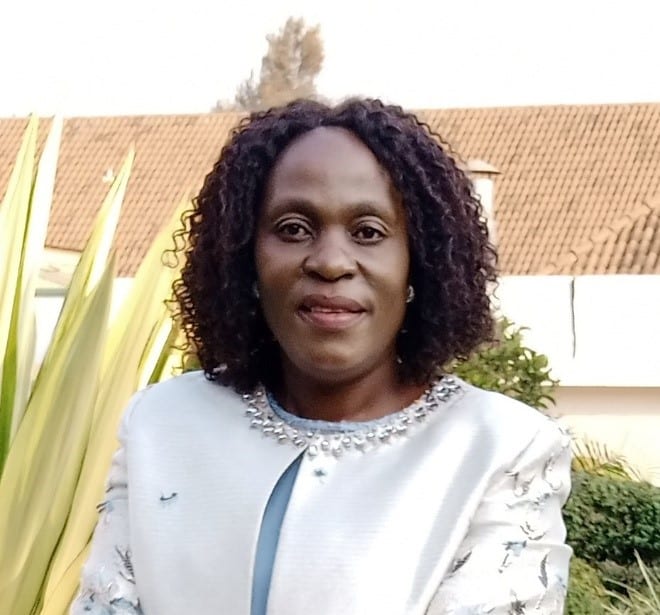
Matilda is one of three women who have been promoted to Country Director in their respective countries over the last year. I recently connected with Matilda over Zoom where we talked about gardening, our favorite places to go for walks and her passion to empower women and girls throughout Malawi.
“Looking around Malawi, you will find that there are very few women in leadership positions,” Matilda said. “So when this message came to me — Matilda apply! Matilda apply! — I thought, ‘I have to so that I can be a mouthpiece for women. I can be an inspiration to young girls who are struggling out there in the village.’”
I am excited to share part of our conversation with you today, and I hope you are as inspired as I was by Matilda’s vision for addressing extreme poverty, child development and gender issues while also being a role model for girls in Malawi and beyond.
Thanks for being here today, Matilda. I’m excited to chat with you today.
Yes, thank you.
First, how long have you been working at World Relief, and what did you do before you became Country Director?
I joined World Relief in January 2017 as a project manager for the scaling up nutrition project. Before joining World Relief I worked with different international organizations coordinating and managing nutrition projects — both in emergency contexts where we distribute food to malnourished children as well as in development contexts where we roll out health education and promotional health messages. I have always enjoyed working with children in nutrition work.
What prompted you to take on the leadership role of Country Director?
First and foremost I applied to this position is because I felt God was calling me to lead this organization. To be frank, I never dreamt to be here — to be a country director. When the job was first posted, I did not apply. But then I got encouragement from a lot of people. They said, Matilda, I think you would be a good leader, you should apply. So I said, I think God wants me to do more than just be a Manager. So, it was more of answering his call.
But then I also felt it was time, because looking around Malawi, you will find that there are very few women in leadership positions. Because of social norms in Malawi, already parents prefer a boy to go to school and a girl to marry. Especially when resources are minimal, parents think that after a girl marries, the husband will also be able to take care of them. So girls are already disadvantaged at a very young stage.
Recent studies have shown that only 3% of young Malawian women have a degree. So out of that, it means that there are very few women in leadership positions. So when this message came to me — Matilda apply! Matilda apply! I thought I have to so that I can be a mouthpiece for women. I can be an inspiration to young girls who are struggling out there in the village. I can also encourage women. So I said, “Let me take the challenge!”
What are some of the goals and dreams you have for the communities we serve in Malawi?
I want to have a strong church. I would really like to strengthen our Integral Mission work so that we have a church that is able to respond to God’s call. God wants the church to help people who are marginalized, people who are sick and the poor. That is the role of the church so if we can strengthen the church and help the church understand its role, then whatever we are doing we will find that a strong church is our foundation — that is my dream, to expand what we are doing.
What are one or two of the biggest challenges you hope to address in Malawi?
In Malawi, there is a lot of poverty. If we could do more sustainable economic empowerment, we would be able to get our communities out of deep poverty. If we are able to move them even just a little bit, most of the issues that we are struggling with, we can find solutions — like issues of education, health, nutrition. These issues occur because people are living entirely in poverty.
The other issue is, since I was in college, I have had a passion for the girl child. As an undergraduate, I went on a project where we were mobilizing girls to go back to school. So now I would love to incorporate gender ministry into whatever we are doing. I would also like to see more gender ministry within the staff and the churches so that issues of gender-based violence that are very rampant in Malawi would be reduced.
How are World Relief’s programs addressing these challenges?
Some of our programs, like Families for Life, are already addressing these issues. If we have a strong family, most of the issues we are struggling with in terms of gender can also be resolved. Programs like FFL need to be scaled up, as do programs like child development where boys and girls are empowered and taught about what is right. Sometimes things are happening to girls because the girls don’t know that what’s happening to them isn’t right. So, growing our child development program would be very good. In terms of economic empowerment, we can look at the Savings for Life program. We need to scale up these projects because we have seen a lot of success and heard a lot of good stories. But we need more resources to be able to scale these innovations.
What has been your favorite thing about working at World Relief so far?
The spiritual component has benefited me quite a lot as a person. When I first joined World Relief, I was a Christian. But some things I would not do as a Christian. But now being in World Relief, there is a component of spiritual formation where we share the word of God, we have prayer and fasting. That has helped me grow in my spirituality. I have been able to exercise some of the spiritual disciplines like prayer and fasting.
Another thing is in the past, I was not able to share the word of God. Every time someone would say, “Matilda share the word of God,” I would shy away. But now at World Relief, we share the word of God every day. I’m able to share it with my children and my husband. Every night at eight o’clock we sit and read the Bible and share the word of God. And also in terms of giving. I do a lot of giving and charity work — things that I could not do before World Relief. I pay school fees for two girls. So these are all fruit of being a member of the World Relief staff.
What advice would you give to other women who are leading in the community development areas?
We need to raise the banner for gender equity high, and very high. We need to be advocates for others, to share our story. We now have an opportunity to influence the environment. In some institutions, they don’t have policies in gender equality, while in other organizations policies are there, but they are not reinforced. As women working in development, we have a role to ensure that the working environment is enabling for women and girls who are fighting to get better, to be involved in what’s happening.
We also need to do more in terms of sensitizing the community at large. The government can create an enabling environment, but services are sometimes not accessible because of social norms. We need to sensitize parents that girls are not for marriage. Girls should also be encouraged to use their God-given skills and talents.
And also… the women and girls should be empowered to fight for their goals and their dreams. Like for myself. It was not easy to get here. I had to fight for my goals and fight for my skills. Women and girls should not just give in to social pressure. Social pressure will always be there, but we need to speak out and encourage these women, and as role models, we just need to be there for them and share our stories with them so they will continue to fight and know that it is possible to win.
Sometimes when you are doing something that is opposite to what society is expecting, you are seen as abnormal. We need to continue to show both men and women that we can work together and make our country, Malawi, a better place.
Can you share one story from your work that has encouraged you?
I remember this mother who had twins. We were working to strengthen referrals between community members and health facilities, to ensure that mothers were able to go to the health center in a timely manner.
We created Care Groups and they were trained on how to screen children for childhood illnesses and when they might need a referral. Often, people in Malawi don’t believe malnutrition is due to lack of food. They still think it’s some taboos — like maybe it’s because the husband is promiscuous. That’s the belief out there and one of the things we need to address.
When I met this mother, one of her children, at 16 months, could not attain milestones such as crawling because she was underweight. The malnutrition may have been worse because there were twins, so maybe she was struggling to feed both of them. We referred them to the health facility where the child received Plumpy’Nut for a month. After that, they came back to the community and we continued counseling the mother on how to feed both of her babies. We also assisted her with livestock so that she could raise chickens and take the eggs to feed the babies. And we encouraged them to have a backyard garden so they could use the vegetables to feed the babies.
This past February, we followed up with these kids. They are four years old now, and it is very exciting to see them. When I look at that baby, it brings a lot of joy inside me. If it hadn’t been for World Relief, I don’t think she would have been alive. Many children in Malawi don’t reach their 5th birthday, and the reasons they are dying are preventable. Our volunteers are doing a very good job identifying these women and encouraging them to go to the health facility for assistance. That’s one thing I like about doing nutrition projects — when your programming is good you can immediately see results, saving the lives of children.
We are so grateful for Matilda and all of our Country and U.S. Office Directors. Please join us by praying for them — that God would give them wisdom as they lead and for continued strength and unity among their teams. And pray that God would bring their vision for community transformation to fruition.

Rachel Clair serves as a Content Writer at World Relief. With a background in creative writing and children’s ministry, she is passionate about helping people of all ages think creatively and love God with their hearts, souls and minds.
Each for Equal
While the last two weeks have brought a lot of unexpected change and uncertainty, we know good is still happening and there are things still worth celebrating. March is Women’s History Month and today, we are taking some time to celebrate women and their impact on our lives.
Throughout history, women have played a unique role in the body of Christ — lifting the vulnerable up and proclaiming a message of Christlike love that is good news for all who hear it. Each year, we celebrate women and the value they hold by observing Women’s History Month throughout March and International Women’s Day (IWD) on March 8th.
Embracing women’s voices and valuing their insight as God’s image-bearers is the central point of IWD and one of the many reasons we choose to celebrate each year. Women have a unique lens through which they view the world, including the ways in which they view scripture.
Much of the Bible was written by and given to a community in the margins of society, and women have been in the margins of the church for most of its history. A woman’s perspective enriches biblical study and blesses the church. Women not only read the Bible differently, but they illuminate the stories of women in the Bible with clarity and intentionality, helping other women see themselves in the Scriptures.
In honor of Women’s History Month and International Women’s Day, Karen Gonzales, World Relief’s Director of Human Resources, has written an e-book that shines a light on women’s stories in the Bible and why women’s theological perspectives matter.
We hope this e-book is not only a welcome and helpful addition to your study of the Bible, but that it provides some additional encouragement while you’re practicing social distancing or sheltering in place.
Our Commitment to Gender Equality
As we celebrate International Women’s Day and reflect upon the theme of #EachforEqual, we think it’s important for us, as leaders, to affirm and reinforce our belief in full equality and inclusion of women at all levels of leadership, as well as to demonstrate the ways we’re working toward achieving this within our own organization.
We recognize the importance of transparency when it comes to these issues, so we wanted to take some time to share with you how World Relief is working hard toward a gender-equal world — both within our programs around the world and also right here at home within the walls of our offices.
This past year, we piloted a gender equality Bible study for our Rwandan staff designed to help them break free from damaging cultural norms and behaviors and empower women to take on more leadership roles within our programs. We train our staff first because we know that God’s word can’t be powerful through us until it is powerful within us.
In 2020, we have begun rolling out gender equality training to all of our staff, arming them with God’s truth that both men and women are created in the image of God and are equally deserving of worth, dignity and respect. We saw the fruit of this effort at our recent meeting of international staff leaders where a full 50% of participants were women.
This year, we also welcomed three new women to our board, a 75% increase in female participation. Our Executive Committee also evolved to better reflect our stance on women in leadership across the organization. This group is now 45% female, and we have undoubtedly become a stronger team in this shift. Finally, we are excited to announce the appointment of WR Burundi’s first female Country Director, Cesalie Nicimpaye.
We believe that gender equality is a matter of both justice and stewardship, and we recognize that we are both more just and better equipped to fulfill our mission when we embrace the gifts, passions and experiences of women and men equally. For that reason, we will continue striving toward gender equality in everything we do. We, of course, recognize that we still have progress to make, but we are committed to this journey and to being #eachforequal, not just on IWD but every day.
Thank you for joining us on this important journey.
Blessings, Tim & Scott

Tim Breene served on the World Relief Board from 2010 to 2015 before assuming the role of CEO from 2016-2020. Tim’s business career has spanned nearly 40 years with organizations like McKinsey, and Accenture where he was the Corporate Development Officer and Founder and Chief Executive of Accenture Interactive. Tim is the co-author of Jumping the S-Curve, published by Harvard Publishing. Tim and his wife Michele, a longtime supporter of World Relief, have a wealth of experience working with Christian leaders in the United States and around the world.

Toward a Vision for Gender Equality in Kajiado, Kenya
At the southern edge of the former Rift Valley province, just south of the Kenyan capital of Nairobi, lies Kajiado, a mountainous region with vast valleys of open space where zebra, giraffe and wildebeest roam. Spread throughout the diverse countryside are communities of the Maasai people — a people known for their brightly colored clothing and the multi-colored, beaded jewelry they wear around their necks and arms. Although they’re widely celebrated for honoring and maintaining their way of life, the Maasai people aren’t without challenges.
World Relief began working in Kajiado in 2018, and it wasn’t long before we came to understand the hard truths of life for people living in this community. 57% of children are under-vaccinated against common yet life-threatening diseases. 10% of children under the age of five are malnourished. 44% of all households are food insecure, meaning that they either do not have enough food or enough money to buy food in the next week. And the rates of preventable diseases are very high due to unclean drinking water and poor hygiene practices.
These numbers alone are difficult to comprehend. And yet, the situation in Kajiado is even more dire for girls and women. Harmful cultural beliefs and traditional practices strip opportunity from thousands of young girls and women and prevent them from achieving their God-given potential, condemning them to a life that is anything but equal.
Among the Maasai tribespeople living in Kajiado today, 78% of all girls undergo female genital mutilation (FGM) — a harmful practice that involves either the partial or total removal of external female genitalia, or other injury to the female genital organs, for non-medical reasons. FGM typically takes place between infancy and the age of 15 and can result in serious, life-long health consequences such as severe bleeding, life-threatening infection, complications in childbirth and increased risk of newborn deaths.
Today, more than 200 million women and girls living around the world have undergone this brutal practice, and the WHO now classifies FGM as a human rights violation.
FGM, however, is just one way gender injustice manifests itself in Kajiado. Only 10% of young girls attend secondary school due to early teenage marriage and/or unexpected pregnancies. In a community that values men as warriors and chiefs, girls and women are given little to no opportunity to break out of the age-old mold and shape their own futures.
And yet, change is beginning to take root.
With the help of 184 local church partners, World Relief is changing hearts and minds through Bible study, behavior-change workshops and vision casting seminars. Implemented through local churches, these programs teach basic biblical definitions of marriage, friendship and equality. Little by little, men and women of God are embracing the concept of Imago Dei and are beginning to speak out against harmful cultural beliefs — in particular, those that harm or marginalize young girls and women.
Take Josephine, for example, a brave woman of about twenty-five years of age and a mother to five children. Her husband is all but non-existent in her life, except when he has material needs. Every few years, he pops back into Josephine’s life, robs her of the food and material goods that sustain her family, and spends her money on alcohol before leaving again.
In Maasai culture, a woman cannot leave her husband even in the most challenging and unfair of circumstances. Therefore, Josephine is forced to stay in this harmful marriage. And yet, there’s hope.
Josephine is surrounded by a band of women from her church, one which partners with World Relief, who have come alongside her to pray with her. They share food and clothing with her during the harder times, and they check in on her to see how she is doing. Josephine is now one of the few in her community to speak out against domestic violence and inequality in the marriage relationship, which is a little talked about issue despite the high number of marriages facing similar challenges.
And then there’s Beatrice, a woman who is speaking out strongly against the traditional role Maasai women are expected to play – a role that burdens Beatrice daily. Often rising at four o’clock in the morning, she spends her days preparing and cooking food for her family, fetching water that’s a two-hour walk away, raising her children, finding ways to cover school fees, caring for livestock, and building and maintaining her house. Most days, Beatrice doesn’t make it to bed until 11 o’clock at night, only to rise again at 4 am the following day.
Now, Beatrice is raising her voice against this kind of inequality. She’s also speaking out strongly against female genital mutilation, which she herself experienced as a young girl.
Remarkably, not all advocates for gender equality are women. Sabore is one of the last laibons in his community – the highest of chiefs in a Maasai tribe and a role that passes on from father to son. A Laibon acts as a ritual leader and has authority over all political and military decisions. Yet Sabore’s testimony is about more than just his generational status. It’s of his status as a follower of Christ. He now speaks out about a hope that far outshines his role and has become a prominent church leader in the community, advocating for the most vulnerable, including many of the young women in his community.
There is still much work to be done in the Maasai community of Kajiado, but we are seeing change take root, and we are committed to continuing the journey toward a gender-equal world, wherever it takes us. Thank you for being #EachForEqual alongside us.

Amanda Patterson serves as World Relief’s Humanitarian and Disaster Response Unit Program Officer in DR Congo and South Sudan. Prior to joining World Relief, Amanda worked overseas as a humanitarian responder to refugee and conflict emergencies in Niger, South Sudan, Greece, and Ethiopia with a large Christian NGO. She is passionate about helping others experience the beauty and diversity of God’s creation through art, nature and cultural engagement.
Voices From the Field: Future for Women
There are more than 3.5 billion women and girls in the world today — women and girls made in the image of God. At World Relief, we envision a world where women and girls are free from violence and oppression, and have the opportunity to live up to their God-given potential.
We asked World Relief female staff working around the globe to share their perspective on women in their nation. Here, they discuss the challenges they face, the opportunities they have, the potential they carry to shape culture and society and, finally, the hope they have in advancing issues of gender justice in their respective countries.
Below is a Q&A with five female staff from World Relief in Sudan, South Sudan and DR Congo — Muraa Rose, Reproductive Health Officer; Puru Jeska Mario, Roving Finance Officer; Suad Yuasif Ibrahim Idriss, Nutrition Coordinator; Esperance Ngondo, former SGBV & HIV/AIDS Program Officer
What is the biggest challenge women face in your country?
MURAA ROSE:
The challenges are many — social, economic, emotional and domestic violence against women. Women are often neglected and disrespected in the community and even their homes. They are often excluded from important decisions, under-valued in their families and in some places even deprived of rights such as attending school.
SUAD:
Women have no power or agency. They are expected to defer to their husbands or fathers in every single decision without question. This includes how finances are spent and resources such as crops and livestock are used.
PURU:
Young women in our country face early and forced marriages. Many parents rely on daughters to bring an income home so girls are restricted from attending school. When girls don’t attend school, they are also more likely to be forced to marry early in order to fetch a bride price for their families.
ESPERANCE:
In the Congo, we live in a society which has become very violent — and where women are considered as prey. Women are the main victims of war because sexual violence is used as a weapon of war. This is likely a result of our culture, which considers women to be incompetent and restricts their rights to almost everything including inheritance, access to school and even their own bodies.
How do you see the influence of women shaping culture/society?
MURAA ROSE:
I am hopeful that we will see a power balance in workplaces as well as more equal employment opportunities for men and women. This would help to empower our women economically. I can see women playing a key role in the economic development of South Sudan. I hope one day women’s rights will be practiced nationwide, particularly in decision making, professional spheres and even politics.
SUAD:
In the past, educating both boys and girls was not a priority. But now, families are investing in both boys’ and girls’ education. Because of this, we are now beginning to see female community leaders and women supported by their families, attending school as adults and even husbands supporting their wives..
PURU:
Because of our ongoing health program, the maternal mortality rate has decreased in South Sudan. Another aspect of our health programming is education around family planning. More couples are practicing planning and having fewer children, which has resulted in more boys and girls able to attend school.
ESPERANCE:
Despite all the challenges that women are facing in our country, they are not staying silent. They are fighting to regain their rights with the support of churches, NGOs and the UN. Currently, there are many proceedings and legal processes beginning that are focused on promoting the rights of women.
How is your office empowering/providing opportunity for women?
MURAA ROSE:
We respect and honor the dignity of all women, practice equal opportunity employment regardless of gender, and we strongly encourage women to apply.
SUAD:
Our nutrition program depends on community volunteers from villages. 75% of those volunteers are female. The success of these programs significantly transforms communities as they see how successful women are in their roles. We also seek to empower mothers and other caretakers through different educational topics in order to improve health for her family.
PURU:
Our most effective way to provide opportunities empowering women is through trainings such as employment opportunities, health services and Bible studies.
ESPERANCE:
We have implemented support programs especially for women, many with the objective to reduce the instances of sexually based violence against women and promoting gender equality.
These programs include:
-
SGBV & HIV Programming — medical, psychosocial and economic support to women survivors of sexual violence. The major objective is to reduce the incidence of sexual violence and HIV, and promote gender equality
-
Trauma Healing
-
Peace Building — Women are now members of local Village Peace Committees, chosen by community members.

Dana North serves as the Marketing Manager at World Relief. With a background in graphic design and advertising and experiences in community development and transformation, Dana seeks to use the power of words and action to help create a better world. Dana is especially passionate about seeking justice for women and girls around the world.
Hope in the Margins

On International Day to End Obstetric Fistula, we asked Brooke Sulahian, Founder of Hope for Our Sisters, to help us learn more about this tragic injury and the ways in which it might be prevented, treated, and healed.
In June 2010, I read about fistula for the first time. That day, God allowed my heart to break, and my life was forever changed.
For the many of you that have not heard of fistula, let me take a moment to explain the nature and causes of this horrific injury. Obstetric and traumatic fistula presents as a hole between the tissues of the vaginal canal and bladder, vaginal canal and rectum or all three. As a result, women with fistula constantly leak urine, feces or both. Many are shunned and abandoned by their husbands, families and communities. An estimated 2-5 million women worldwide suffer from fistula due to obstructed labor (76-97% of fistula cases), trauma (usually caused by violent rape) or medical error.
Many Americans have never heard of fistula, because it is a condition that is nearly obsolete in the developed world. However, it is a huge problem in developing nations where poverty, malnourishment, early marriage and pregnancy, low education levels, political unrest, use of violent assault as a weapon and lack of access to adequate medical care all contribute to the occurrence of fistula.
Perhaps the most tragic aspect of fistula is the ostracization it causes. Women with fistula are made to believe that they have no value and contribute nothing to their community, larger society or the world. In 90% of obstetric fistula cases, the unborn baby will die. Yet rather than receiving the comfort and love of family during this time, these precious women and girls created in God’s image, are pushed to the margins of society in their loss, and fistula keeps them there.
After first reading about fistula, I envisioned isolated women suffering without dignity or hope. And yes, this is the tragic case for many women with fistula. However, recent trips to Angola and the Democratic Republic of the Congo (DRC) challenged this view as I witnessed the dignity, hope, strength and courage of fistula survivors.
While traveling with World Relief in the DRC, I met my first survivors of rape, many with traumatic fistula. Their stories told of their miraculous transformation, from a desire to die to the desire to live, hopelessness to hope and a lack of dignity to a belief in their priceless value in God. Here was strength and courage in the margins.
In Angola, I witnessed Maria put on earrings before we took her picture. I witnessed Celia, battling an infected colostomy, surprise us with smiles, jokes and confidence. Here was hope and dignity where I believed it could not be found!
We cannot let fistula destroy this dignity, hope, strength and courage. Instead, I believe that our investment of hope, love, prayer and resources will eventually defeat fistula, so that the next generation of girls in developing nations won’t have to face such a life of loss.
At Hope for Our Sisters, we began by funding fistula surgeries and will continue to do so. However, we know that treatment is not enough. We want to invest in our sisters before they become injured and prevent fistulas before they are created. Our answer? Prevention, treatment and empowerment.
Obstetric and traumatic fistula is 100% preventable. And though prevention can be hard to measure, it has the potential for lasting impact. Preventative measures are everything from education and awareness, to prenatal care, to proper nutrition, to assisted delivery, and help covering the costs of each of these treatments. At Hope for our Sisters, we partner with World Relief and other organizations to meet these needs.
In cases where prevention is sadly no longer an option, women suffering from fistula need a variety of interventions and treatments to help restore them to health and wholeness. We help to fund fistula surgeries to restore these women to their optimal physical health status, as well as creating empowerment programs that are key to repairing some of the psychological trauma associated with suffering from fistula. Marketable skills, such as sewing items or weaving baskets to sell in the local markets, equip women to contribute to their families and communities while rediscovering a sense of value.
We are also very proud to partner with World Relief on their Sexual Gender-Based Violence (SGBV) program. These groups provide our beautiful sisters with much-needed community, assistance with owning and sharing their stories, opportunities to give back by providing for women who join the groups and the encouragement to help change their culture one step at a time. SGBV groups teach communities across the DRC that all women have inherent value, no matter their circumstances.
We at Hope for Our Sisters and our partners at World Relief see our sisters’ priceless value. We see the lives they could be living and the contributions they could be making. We envision a world where women are valued, live to their fullest potential, and are positive change-agents within their communities.
Together, we can bring God’s precious daughters out of the margins and back into fullness of life.

Brooke Sulahian – Following a successful thirteen-year career in Human Resources and four years as a stay-at-home mom, Brooke’s eyes were opened to the plight of women and girls around the world who lacked access to medical care and suffered from, or were at risk, for fistula. As a result, she co-founded a volunteer group in October of 2010, which led to the founding of Hope for Our Sisters, Inc. in January of 2012. She is driven by her belief in the inherent value of each person and her hope that women and girls around the world will one day be fully cherished and valued by their families and communities, as God intended. Brooke lives in the Boston area with her husband and two children.
Thanking God for A Mother’s Love
During a recent children’s sermon, our pastor asked a dozen elementary students: “What do you like best about your mom?” Their comments brought down the house! We heard how their mom, “put the head back on my Ninjago;” “scared away the monster under my bed;” “put my brother in timeout for hitting me;” “made my favorite cake for my birthday.” Jumping in, our pastor then said, “That is how God loves each of you. God is near when you’re frightened, or ill or afraid. God is always ready to listen to you and help you.”
Our children seemed convinced that God loves us like a mother, but the rest of us hesitated. How often do we consciously remind ourselves of God’s nearness and intimate attentiveness to our hopes and fears? Or that God is above gender yet inclusive of all gender—the source of what is true and good in humankind? That God created both male and female in God’s image, and that God’s fullness can only be expressed and fully appreciated in the fullness of genders, which God declared, is very good (Genesis 1:27, 31). While Mother’s Day can be painful for the childless and motherless alike, as well as the socially isolated, everyone can be comforted by God’s love.
Like a mother, God patiently suffers beside us in our fears and failures, nurtures our hopes and sustains us through every trial. That is why Mother’s Day is not only a time to give thanks for our earthly mothers, but also to remember that our Creator, Redeemer and Sustainer, like a cheek-to-cheek mother, knows us intimately and willingly suffers any cost to comfort, strengthen and guide us.
While Scripture teaches that God is Spirit (John 4:25) and warns against creating earthly images of God (Exodus 20:4), it also teaches that “Christ is the visible image of the invisible God” (Colossians 1:15-21). Christ cooked for the disciples (John 21:9); washed their feet (John 13:8); healed the ill (Luke 8:40-48); and wept over Jerusalem (Luke 19:41). Despite the disapproval of his disciples, Christ also honored mothers and women by welcoming them as disciples, inviting them to sit at his feet and learn from Him—a privilege that was previously reserved for men only (Luke 10:38-42). Christ prepared women as evangelists and proclaimers of the Good News (John 20:17). And when a woman was caught in adultery, Jesus invited those without sin to cast the first stone (John 8:1-11). Women’s dignity and leadership was implicit in Christ’s teachings, practices and in his challenges to the marginalization of women.
Elevating mothers and women, Christ used motherly metaphors to illustrate and amplify God’s nearness, providence and tenacious protection. In warning against the hypocrisy of the Pharisees, Jesus displayed a mother’s heart that longingly protects her children, but wisely allows them free choices despite the pain God suffers when they choose unwisely. Like a mother, God cried out: “‘Jerusalem, Jerusalem, you who kill the prophets and stone those sent to you, how often I have longed to gather your children together, as a hen gathers her chicks under her wings, and you were not willing,” (Matt. 23:37b).
Just as the father waited for his prodigal son, God also searches for us, God’s lost sheep, like the woman who lost a priceless coin. Unwilling to rest, she lights her lamp and furiously sweeps the house, searching in every corner until she finds her lost treasure. And, just like the father who celebrates when his prodigal son returns home, the woman also delights when she finds her priceless coin. She “calls her friends and neighbors together and says, ‘Rejoice with me; I have found my lost coin.’ “In the same way, I tell you, there is rejoicing in the presence of the angels of God over one sinner who repents,” (Matthew 23: 9-10).
God’s work is inseparable from the hands and feet of mothers, and of the women who proactively proclaim the gospel in word and deed. Because Scripture speaks of God in both fatherly and motherly terms, we recognize that both qualities are necessary to strengthen our lives and nurture our souls. In remembering our mothers, we celebrate God who created women and mothers, and loves us like a mother. God’s motherly love is always ready to fight to the end, rather than be separated from her own flesh, just as a mother bear protects her cubs (Hosea 13:8).
On Mother’s Day we take comfort in knowing that, whatever our failures, hopes or fears, like a mother, God will move heaven and earth to reach us, heal us, lead us and comfort us.
God, thank you for loving me, and all of us, also as a mother.

Dr. Mimi Haddad is president of CBE International. She is a graduate of the University of Colorado and Gordon Conwell Theological Seminary (Summa Cum Laude). She holds a PhD in historical theology from the University of Durham, England.











